|
“This is Major Tom to Ground Control
I'm stepping through the door
And I'm floating in a most peculiar way
And the stars look very different today.”
That is the sequence of verses that David Bowie made immoral in his 1969 hit song “Space Oddity”. Whenever I think of flights, aircraft, air cargo, freighters, ULD’s, pallets, you name it, I get dragged into a sort of ground control to Major Tom feeling. I enter the capsule with great hopes, but then I often find myself stranded in outer space with many, many questions, “one hundred thousand miles” from home.
Plausibly then, for the FIATA Headquarters’ session on air freight, I harboured great expectations elicited by quite a title: “Building a Modern Airfreight Logistics Future”, but came out without a precise idea of what the future had in stock for us.
The stipulation was to explain how “the air cargo industry remains a cornerstone of global trade, facilitating seamless goods movement amid maritime disruptions and the sustained growth of e-commerce”, whilst the “regulatory frameworks evolve” and “industry players must ensure compliance with new security requirements.” The declared promise was that “participants [would] gain actionable insights and strategies to enhance cargo security, optimize operational efficiency, and improve overall supply chain resilience and performance.”
In my view the methodology prevailed on the substance in this case; the group was almost immediately divided in three subgroups: ULD’s, Global Programme and Security. Participants were engaged in a discussion of principles that did not appear to immediately coincide with the primary concern of AFI members, which is and remains the Air Cargo Programme with IATA. Delegates wanted to know what was happening in the negotiation with IATA, the rests could wait! With regard to the mood in the IATA/FIATA programme’s group, just to give you an idea so that you do not need to run down to that part of the article right now, at the moment I can register that hope remains strong. That’s it! Everybody agrees that the Secretariat is intensely engaged in the discussions with IATA; where and when and how still remain open questions. One could argue that it is much better than pulling the plug, which seemed to be the result about two years ago . . . Nobody can deny it, but . . .
The subsequent part of this article is more or less an extract of the conversation held in the spacious Geneva Congress Centre on the topic of the day. The reader will please forgive any possible inaccuracy, which we can amend by re-publishing, if required: “Global programme: there was debate about the relationship; nothing is ideal as yet; we have been speaking about the same topics for years and seen little improvement. From everywhere in the world, we are thinking the same way . . . FIATA has had a lot of pressure: it is a challenge to gather the needs of members and be successful with IATA; you do the best you can . . . With a global programme it would be different now . . . we do not feel that we are customers, we need to be considered as partners and it is still not the case.” These were the voices we heard in the room and the direction shows a clear message in my view.
From my totally personal point of view I can only register the fact that, whenever we talk of the programme, we inevitably seem to be dragged into the nitty gritty of CASS, and in my view this is not positive. I had often discussed this point with people who are much more knowledgeable than I, and think differently. Yet they never managed to convince me that CASS and the programme should be interlocked. Actually, the more we talk the stronger my opinion is that the two should be related, but remain completely separate. In reality today’s discussion contained also all the other topics that a good, professional, well-designed and comprehensive programme should cover, most of them having nearly nothing to do with CASS. These are many and diverse: security, use of equipment such as ULD’s, uniformity of rules and treatment, training, compliance, standards and SOP’s and we could go on and on. Unfortunately, we end up sitting at a table where the only things that matter are finances, guarantees and the expectation of global uniformity in CASS that is so far unachieved. One could argue that money makes the world go around, but . . .
I hope my wailing does not sound as criticism, because the work done so far has been massive and certainly not easy, but in my view there is an in-built discrepancy, which traps everybody in an Achilles’s tortoise paradox, where nobody actually gets anywhere. As a good German friend of mine used to say when he was hoping for something that he considered unlikely: ich lasse mich gerne überraschen (I shall gladly let myself be surprised). So that is more or less how I felt about the whole situation at FIATA’s AFI.
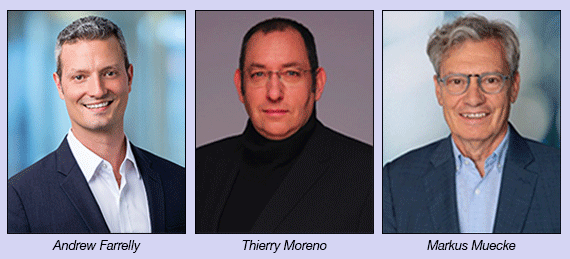 |
Andrew Farrelly, CEO and Co-Founder, CT Strategies, Markus Muecke, Chair of the European Air Cargo Programme Joint Council (EACP-JC), Thierry Moreno, CEO and Founder, NV Logistics, acted as facilitators in the breakout sessions and I must commend their expertise and diplomatic ability in keeping everyone in the same boat, err . . . plane.
Here follows what I was able to capture by listening to the reports on the different sessions. Again, I shall be more than happy to stand corrected, if I misunderstood any of the reports and we shall be more than happy to publish any amendments, as and if they get submitted. From my personal point of view, the most alarming signal that I captured within the sessions was contained in the SLIDO polls: quite a few candidates candidly admitted that “we shall miss the digital agenda”. In 2025 this sounds precarious.
The Security group held a very lively session, starting from the question “what are they main concerns within the group?” At random, issues emerged such as modernization, cybersecurity, etc. then streamlining security requirements took the stage: “Different entities ask for the same elements again and again. How can we, as a community, engage in a better way with the regulators and send them a message before anything is written down? Events in the last few years caused a lot of concern, especially for the community engaging with the regulators. Somebody must be talking to Customs . . . maybe not to the right people, or not the right entities are doing it? The communication of the actions taken and the data requested must meet the requirement of lowering the threat presented, but sometimes this does not actually happen . . . We must say: ‘You and we have as much interest in protecting the plane as anyone else, as well as the regulators do;’ we have the same interest in presenting the question in the same manner.” Andrew Farrelly summarized this in a couple of words: “a consistent engagement with regulators and speaking with one voice.”
In the ULD’s group several concerns were voiced: “Looking at operations and loading requirement, e.g. professional training is mandated in Australia; looking at the cost, it is minimal, if compared to the advantage for a company’s reputation. Cargo not being handled professionally is not something that can be acceptable and professional training in loading should be mandated,” this was the opinion voiced in the room, perhaps not unanimously. Some members invoked support from FIATA for mandating professional training for “load and restrain”, but this idea was contended. It was noted that handling ULDs and pallets requires a certain level of practice to ensure safe and secure operations, as well as a good collaboration with the airlines: “it is easier said than done,” others noted. In particular, ULDs proposed by a particular airline can pose challenges: airlines should check that ULDs are returned in good order. Another observed that “ULD conditions was a topic initially dealt with by IATA regarding damages, the safety segment came only later.” There was a remark that some countries do not even allow forwarders to handle ULDs directly, so it could become chaotic, if the idea of ‘mandatory’ is adopted. Somebody observed that this discussion had been put ‘on ice’ in a specific area. A delegate asked if software to address these issues efficiently exists, whilst it was also observed that carriers think that forwarders are custodians of the equipment and this is not an acceptable approach. It was concluded that if an operator is not qualified, it should not build pallets or use ULDs. Another observed that the use of best practices could assist, and it was also observed that even the nature of the commodities could play a role. Common issues within the industry appeared to be damaged equipment, changing weather circumstances, oversize cargo, all parties in the supply chain working with uncertain roles.
Regarding airfreight in the Netherlands, a Dutch delegate said that: “air cargo is not very interesting for the airport . . .” It is difficult to explain to airports the importance of air cargo: we need to explain that air cargo is making flying more affordable and creates a lot of jobs in the area. AMS Schiphol will now engage in a revived effort to enhance air cargo, after a historical battle in this direction.
A Slovenian delegate was questioning IATA CASS’s implementation in his country and observed that IATA’s feasibility study did not even include the local forwarders’ association’s views. DG Stéphane Graber did not hesitate to answer: this point was received within the IFCC and IATA was asked to engage with the local association and provide information on what onus would have to be borne by Slovenia: FIATA continues to discuss with the IATA management, expecting proper consultation on the market analysis.
The AFI Chair closed the meeting informing everyone that “we are heading in the right direction with IATA”; he also noted that the following week there will be an IFCC session, where the elected Chair would be ‘expression of the freight forwarders’ side for the first time.’ In the zigzag of this indispensable, but not always peaceful relationship freight forwarders have managed to get to the head of the discussion. This is certainly a success and I know from experience that they will be unlikely to abuse their new position.
This could be an opportunity for IATA to realize that, far from being a battlefield, as some may think, the relationship with forwarders should remain a systematic, intelligent approach to deal with the shippers and their challenging requirements. Working in this symbiotic relationship saves millions in airlines’ investments, thus fulfilling IATA’s objectives completely, no need to push the cart downhill when it runs on its own . . .
At the end of the day, everybody understands the importance of “ground control”, but the airlines still need to fly their aircraft and somebody needs to deal with the goods, help with revenues, etc. Take a guess at who is doing this?
This final message concludes our second piece on the FIATA Headquarters in Geneva. I hope this article was useful and informative. Surely it contains more questions than answers, but this is what I have gathered at this session of the conference. If there is anything factually incorrect, please advise and it will be amended. Other than that, let me wish FIATA and IATA complete success in their endeavour, and if their agreement arrives soon everybody will be happier.
Words of David Bowie: “Now it’s time to leave the capsule if you dare . . .”
Marco Sorgetti |
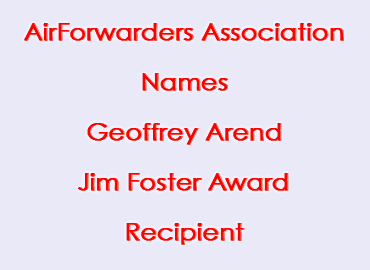



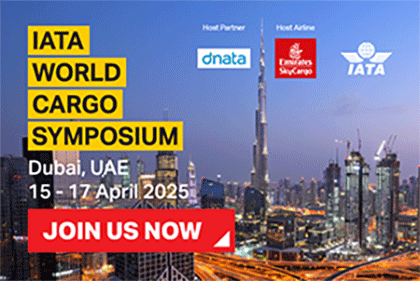
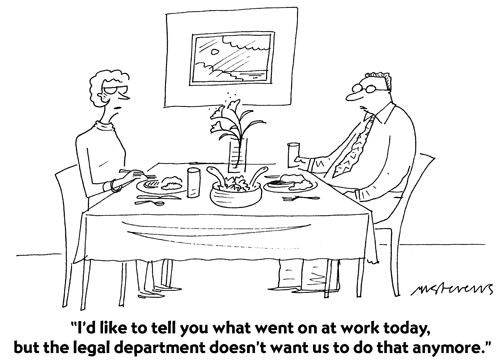

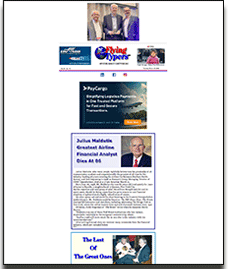
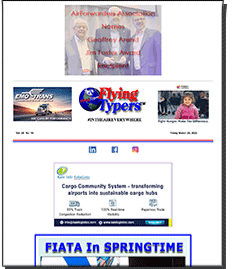 Vol. 24 No. 16
Vol. 24 No. 16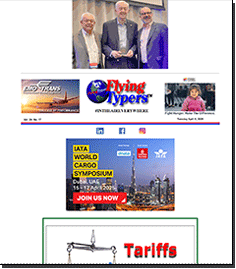 Vol. 24 No. 17
Vol. 24 No. 17